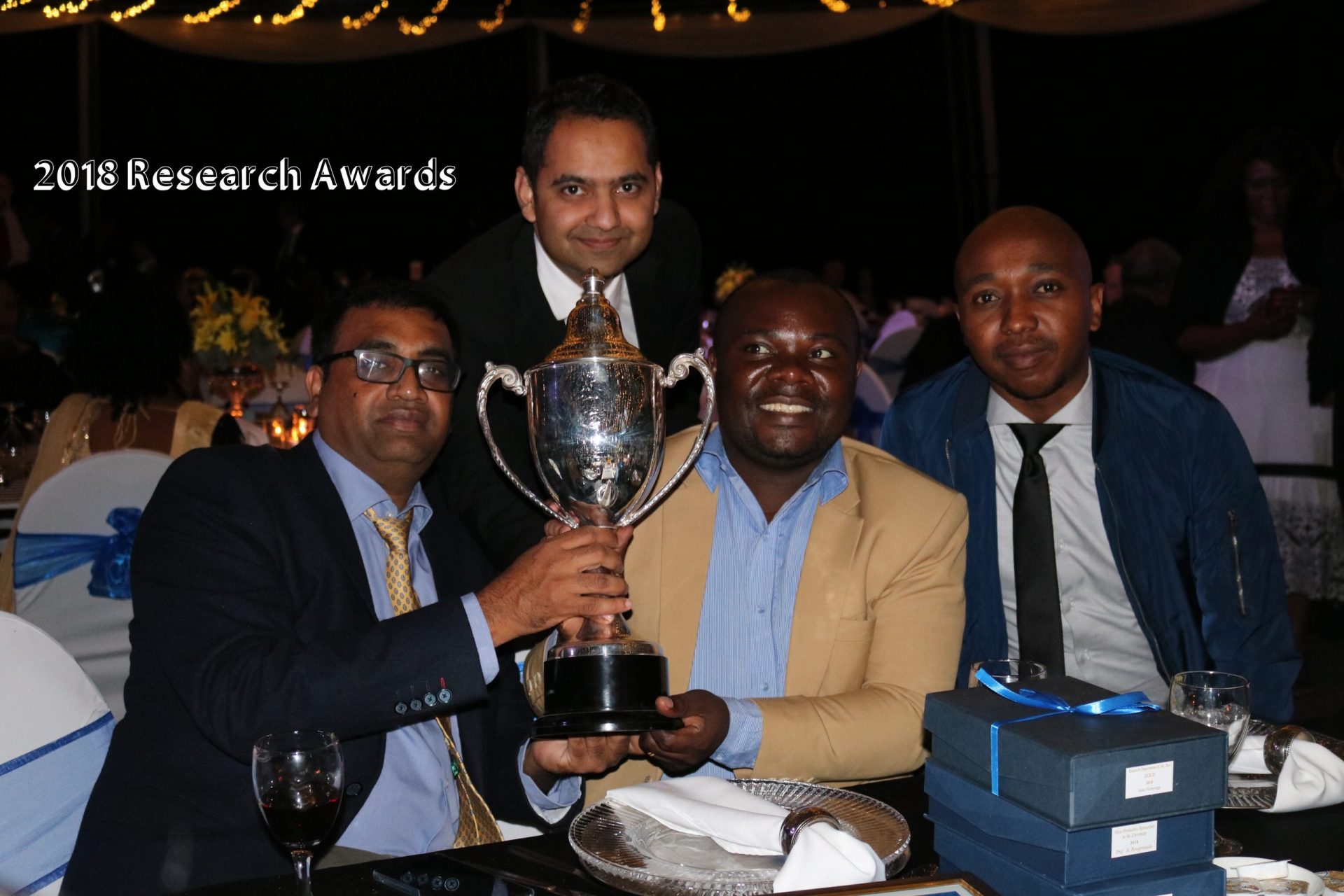Recognising Excellent Research and Innovation

The University of Zululand (UNIZULU) recently recognised academics who have excelled in their quality and breadth of research-led innovation across the institution during a prestigious awards gala dinner held at the Umfolozi Casino, Empangeni.
The Research and Innovation Awards, organised annually by the institution’s Research Office, were launched in 2016 with the aim of recognising and celebrating exceptional research-led innovations and products at all University levels that are having societal impact.
In her opening remarks, Professor Xoliswa Mtose, UNIZULU Vice-Chancellor, congratulated all the awardees. “A special congratulatory note to all our colleagues (researchers, students, research technicians and managers at all levels and partners) who have been selfless and have contributed in various ways to ensure that our research and innovation profile outlook for 2018 is enhanced. Through research, we learn that improvement is an ever evolving cycle, therefore individual curiosity, often working without practical ends in mind, has always been a driving force for research and new ideas,” Prof Mtose said.
The awards were divided into three categories namely, bronze, silver and gold. The Department of Public Administration walked away with the bronze prize for having produced the third highest units per capita. In the silver category, with the second highest units per-capita, was the Department of Chemistry and Microbiology. The Department of Nanotechnology walked away with the grand prize in recognition of being the department that produced the most units per-capita.
According to Daniela Viljoen, Chief Research Admin Officer, the University’s research output has grown since the inception of the annual Research and Innovation Awards ceremony. “It makes us proud to be part of such a vibrant and hardworking team of researchers and believe that we are going to grow in leaps and bounds in the years to come,” Viljoen said.
Dr Andrew Kaniki, the Executive Director: Knowledge Advancement and Support (KAS) of the National Research Foundation (NRF), was invited as the keynote speaker during the event. He congratulated the recipients and urged them to continue their excellent work. “On behalf of the National Research Foundation, I wish to congratulate all of you who are being recognised in various categories for your excellent achievements in research and innovation-related activities. Without a doubt, this celebration and recognition of achievements are a clear indication that the University of Zululand and its researchers are committed to the intellectual project; to the pursuit of outstanding academic enquiry and discovery; to the development of this country’s human capacity; to our collective quest for a sustained competitiveness of the country; a commitment to our country’s meaningful engagement in the knowledge economy and, consequently, to addressing South Africa’s inequality and poverty,” Dr Kaniki said.
Dr Kaniki also highlighted that according to the 2016 Vital Stats, published by the Council on Higher Education (CHE), UNIZULU’s research output units per-capita had significantly improved from 0.26 in 2011 to 0.40 in 2016. “It is gratifying to see that the university has been progressing upwards, but you will all agree with me that there is room for improvement and for individuals to grow. The outcome of this is not only personal development and advancements if per-capita were even above 0.50, but the subsequent Department of Higher Education subsidy that would come to the university; subsidy that would be reinvested into even more research and academic work. Importantly, the number of researchers that contribute to the overall research output must increase. The number of researchers that access research funds not only from the NRF must increase! The institution cannot only depend on the few prolific researchers to carry the bulk of the university in terms of research output and sourcing/leveraging research funding,” Dr Kaniki concluded.
- Precious Shamase














7 Comments
There is some nice and utilitarian information on this site.asianet news online live
We always follow your beautiful content I look forward to the continuation.<a href="https://www.google.com.pe/url?sa=t
Greetings! Very helpful advice in this particular article!-tv live stream kostenlos ohne anmeldung
A big thank you for your blog.Really looking forward to read more.Safety 1st Nursery Care Health
As I website owner I believe the content material here is really good appreciate it for your efforts. – hey dude shoes women
You have noted very interesting details! ps decent web site. clarks womens shoe
Greetings! Very helpful advice in this particular article!